#merawi gerima
Explore tagged Tumblr posts
Photo

Residue
directed by Merawi Gerima, 2020
#Residue#Merawi Gerima#movie mosaics#Obi Nwachukwu#Obinna Nwachukwu#JaCari Dye#Julian Selman#Melody Tally#Taline Stewart#Ramon Thompson#Derron Rizo Scott#Rizo Scott#Derron Scott#Dennis Lindsey#Mama Hasinatu Camara#Jamal Graham
18 notes
·
View notes
Photo
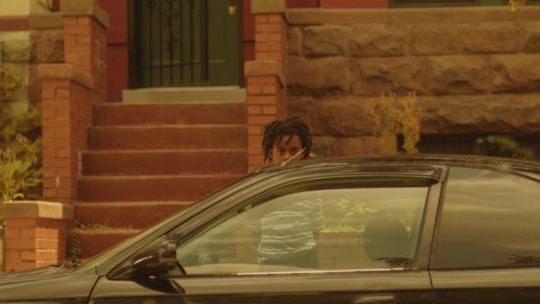
Green-Light Yourself.
As Merawi Gerima’s debut feature Residue lands on Netflix, he tells Gemma Gracewood about being the son of indie film legends, duty of care as a director, and why Akira is his go-to comfort movie.
Sometimes it’s impossible to move forward with your art until you’ve taken a good look back. In Merawi Gerima’s impressionistic and hypnotic first feature, Residue, a young man, Jay, returns from college on the West Coast to find that his Washington, DC neighborhood has been hugely transformed within a few short years. A white neighbor barks at him to turn his car stereo down. Familiar faces have disappeared. The gentrification is debilitating, but Jay’s efforts to work out his disorientation and rage through art meets opposition with old friends.
Like his lead character, Gerima is both a DC native and a graduate of a West Coast college (USC’s School of Cinematic Arts), and was similarly confronted by change when he got home. Making Residue was “absolutely something that I had to do because that was the only positive direction to pour my energies into,” he says. “I think that there was a lot of destructive potential in my life at that point. The film really was the first moment when I started to feel that I perhaps was not powerless in this situation.”
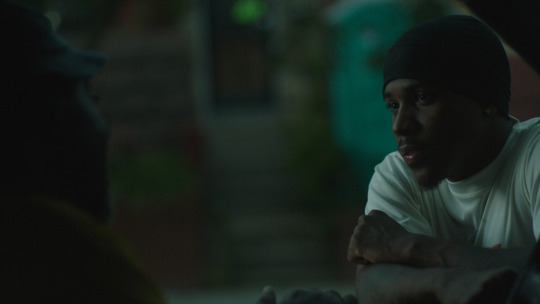
Derron “Rizzo” Scott as Mike in ‘Residue’.
Gentrification as a form of structural racism has long impacted Black communities, and Gerima is not the first in his family to cover this ground. His parents are the LA Rebellion filmmakers Haile Gerima, whose work includes the Golden Bear-nominated 1983 slavery drama Sankofa, and Shirikiana Aina, who documented changes to their DC neighborhood in her 1982 non-fiction short Brick by Brick.
Residue was a family affair; the Gerima name is all through the credits. “My aunts were the chefs; my sister, she was, like, the head of the catering.” Although his legendary father managed to get off lightly with Costco runs, Gerima’s equally impressive mother ended up anchoring two of the film’s most affecting scenes, as Tonya, the Mom of Jay’s childhood friend, Mike (Derron “Rizzo” Scott).
“I had somebody else cast—she was a no-show. My mother was on set that day, just kind of helping feed people. I knew that she had what we needed, emotionally speaking. She was actually trying to drive away to go find the woman; I was like, ‘Nah, I need you right now’. She did it, but at a great cost.” The thing about filming in your own neighborhood, Gerima explains, where you’ve raised not only your own but also everyone else’s kids, with varying outcomes, is you end up bringing that lived experience to your scenes. “It’s very real for her. She’s not acting. I almost cried once we finished filming. Nobody spoke for a long time.”
The scene taught Gerima much about a director’s duty of care—particularly when he dared to ask his mother for a second take of a pivotal scene that takes place in a downpour. “In preparing to shoot in the rain we made a few mistakes, with the camera, the placement, there was miscommunication with me and the DP [Mark Jeevaratnam]. I, he, we both agreed that we needed another take. When I asked my mother for another take, she just looked at us like, it hurt, it was painful to ask. She did what she could, but you could tell that she didn’t have it in her.” As it turns out, the first take was the one. “I thought we ruined everything, but once I slowed down, I just saw what a miracle it was.”
It’s impossible to separate Residue from its limited budget and circumstances. Structurally rich and technically unusual, the film is a triumph of local knowledge, happy accidents, and “hood auditions”, where people were pulled straight off the street into the cast. It’s infused with an all-hands-on-deck spirit, constructed scene-by-scene during a home edit by Gerima himself.
“We shot the first draft of the script. You know what I mean? We didn’t have time to wait for a rewrite. We didn’t have time to wait for money. We didn’t have time to wait for anything. In many ways, it was the source of many of our problems, but it was also the source of a lot of our freedom, because we weren’t tied down by money. We weren’t tied down by a locked-in script.”
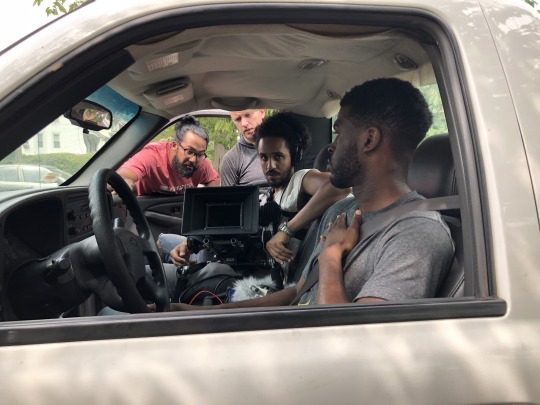
Mark Jeevaratnam, Merawi Gerima (with camera), and Obinna Nwachukwu on the set of ‘Residue’.
At Slamdance this past January, Residue won the audience award, and an acting prize for its star, Obinna Nwachukwu, whose story is a lesson for other aspiring actors. He was right for the role (“He fit the bill in terms of, he knows DC lingo, he knows the culture, he’s from the area, which was incredibly important”). More importantly, he was available. “The fact that we didn’t have resources, we needed somebody like him. He wants to act. He designs his life in his way where he was able to give us two weeks without knowing much about us. Once we got him, everything else became a lot easier.”
After Slamdance, of course, 2020 took a bit of a turn. Residue was shortlisted for Cannes, but that was cancelled and in May Gerima told his college paper: “I think that the festival prospects for the rest of this year are getting dimmer by the day.” When we speak, however, he is in Venice, where his debut feature has just screened in the independent Venice Days section of La Biennale di Venezia. It turns out that Cannes Directors’ Fortnight head Paolo Moretti had put in a word with Venice Days. As 2020 goes, this is as good as it gets for new filmmakers—and is a beautiful demonstration of how the global festival community has pulled together to make something good out of the mess we’re in.
Likewise, Gerima is grateful to Ava DuVernay’s ARRAY Releasing, who made the Netflix deal. He notes that a Black-led distribution company is a luxury his parents never knew. “I think if Ava did not exist, our film probably would not have distribution. The broad imagination necessary to see the commercial potential of Black films is still not there. I’m often sad thinking about the fact that my parents had no such opportunity.” Like a scene straight out of Dolemite is My Name, Gerima describes how his folks would book their own theaters across the US and use the African diaspora to help fill them, “proving the commercial nature of these films, in communities that hungered for real Black stories”.
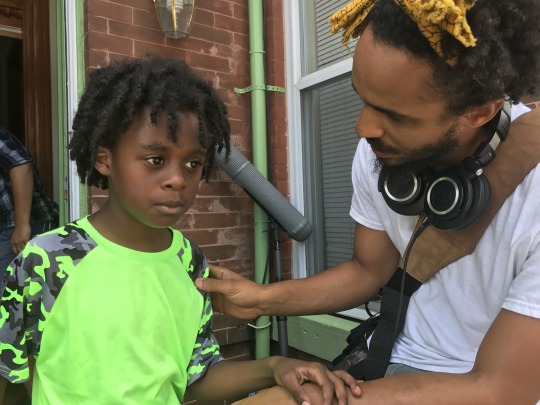
Merawi Gerima directs Jacari Dye on the set of ‘Residue’.
Gerima’s film appetite is wide, and he’s often looked outside the US for inspiration. Some of the most crucial films in his development as a director have been the 1968 post-revolutionary Cuban films Lucia and Memories of Underdevelopment. He is also a fan of La Lengua de las Mariposas (‘Butterfly’, 1999, José Luis Cuerda), which has “one of my favorite endings in film, period”. Japanese influences include Akiro Kurosawa’s Seven Samurai (1954) and Kaneto Shindo’s The Naked Island (1960) and he also looks to Chilean legend Miguel Littin and Soviet directors Andrei Tarkovsky, Sergei Eisenstein and Nikita Mikhalkov. His go-to comfort film? “Akira. I don’t know if it’s comfort, but I watch it all the time! I just think it’s one of the best films ever made.”
On the home front, an “incredible, important” American film is Ivan Dixon’s 1973 action drama The Spook Who Sat by the Door, while the movies that “really put me onto talking to girls” are Gina Prince-Bythewood’s Love & Basketball and Rick Famuyiwa’s The Wood. “These are the types of films, circulating within the Black community [that] we memorize the lines to. That set the sexual compass of Black adolescents, you know what I mean?”

‘Sankofa’ (1993), written and directed by Haile Gerima.
His parents, however, remain Gerima’s greatest influence. “Sankofa was made without arbitration. Black stories that have no minders like that, nobody to answer to, often are far and away, the most honest types of Black storytelling that we see in film.” For other storytellers yet to take the first step, he offers this: “My best lesson from this film has been to always and at all times green-light my own self, my own actions, because that’s the only thing that I can control—and to not wait for conditions to be right or perfect.”
Acknowledging the privilege of being born into a filmmaking family, Gerima adds: “That may not apply to everybody. There are many, incredible things which prohibit action at times. But I think that there are many incredible conditions under which people can take action with the camera. I think that it’s really just a matter of how urgently that story burns within you. I can only say for myself, that’s the way the film got made. Without that, it would have been literally impossible.”
When asked who we should watch next, Gerima recommends 200 Meters, written and directed by Palestinian filmmaker Ameen Nayfeh. (“He’s an incredibly poised and principled filmmaker.”) The film won the audience award at Venice Days. He also recommends Really Love by Angel Kristi Williams, which won a SXSW Special Jury Recognition for acting, and will feature as a Special Presentation at AFI Fest next month.
‘Residue’ is in select US theaters and on Netflix now. Follow Gemma on Letterboxd.
#merawi gerima#haile gerima#la rebellion#residue#netflix#netflix film#array#array releasing#ava duvernay#washington dc#washington dc films#usc#usc cinema arts#letterboxd
7 notes
·
View notes
Text
400 Words on RESIDUE ★★★★★

Write about films for too long and you run out of metaphors for dreams. Like a word you turn over and over again in your mouth until it’s just an abstract sound, all the adjectives for dreams have lost their punch for me over the years. Surreal. Lucid. Oneiric. Hypnagogic. What do these words truly mean anymore? Then along comes a film—and more importantly, a filmmaker—that reminds you why these words were once so important to you. Residue is one such film and Merawi Gerima one such filmmaker. That he is the son of Sankofa (1993) director Haile Gerima is irrelevant, for his is a voice so utterly unique and personal that it defies easy comparison. Is he Chris Marker by way of Spike Lee? Charles Burnett with an iPhone? A street-smart Jonas Mekas? None of these are sufficient. To watch Residue is to surrender oneself to a totally new, totally original vision. Inspired both by his upbringing in a redlined DC neighborhood and said neighborhood’s savaging at the hands of white gentrifiers, the film is both autobiographical confessional and kaleidoscopic rumination on memory, trauma, and yes, dreams. The story: young filmmaker Jay (Obinna Nwachukwu) travels from his home in L.A. back to his childhood neighborhood in DC to reconnect with old friends and family to gather material for a film he hopes will “give voice to the voiceless.” He finds instead that he may as well be on Mars: much of the black community has been priced or bought out; the old family homes have been gutted and subdivided for white twentysomething renters; the few remaining stragglers see him as a foreigner and treat him alternatively with aloofness and contempt. As Gerima peels back the layers of history and memory, past melds with present as does the imagined with the real. Ghostly specters of adults as children and children as adults appear and vanish like smoke. Characters appear like Resnaisian riddles without introduction or explanation like Blue (Taline Stewart). (Who is she? His childhood girlfriend? Did she come with him from California?) White people are amalgamated into an oppressive presence, shot from afar, from an angle, or not at all. Jeering, unseen cops hunt the streets. Prison cells become forests and kitchens human abattoirs. And at the center of it all a little black boy, now a black man, who can never go home again.
2 notes
·
View notes
Link


10 notes
·
View notes
Text
‘The Whaler Boy’ Wins Venice Days Award, as ‘Ghosts’ Tops Critics’ Week
By Guy Lodge Sep 11, 2020 11:20am PT

Courtesy of Loco Films
Before this year’s Venice Film Festival comes to a close with Saturday’s announcement of the official selection awards, the fest’s autonomous sections got the ball rolling Friday with their own prizes.
Coming out on top in the Venice Days program was Russian director Philipp Yuryev’s debut feature “The Whaler Boy,” an offbeat story of a teenage whale hunter on the Bering Strait, who sets out to meet the webcam model with whom he’s become obsessed.
The film, which is produced by Alexey Uchitel and Kira Saksaganskaya of Rock Films, received the Director’s Award — which carries a cash prize of €20,000 ($23,668) for Yuryev and Paris-based sales agent Loco Films — from a jury headed by Nadav Lapid, the Israeli auteur who won last year’s Berlinale Golden Bear for “Synonyms.” Unusually, the jury’s extended deliberations were live-streamed to the public. In a statement, Lapid praised Yuryev’s film for “[depicting] a world that has not yet been explored with such cinematic precision and such confidence.”
Two other Venice Days selections received special mention from the jury: American director Merawi Gerima’s first feature “Residue,” an experimental, mystery-fueled study of a Black community in Washington D.C., and “Conference,” the latest from rising Russian talent Ivan I. Tverdovskiy (“Jumpman,” “Zoology”), which examines intimate family tensions against the backdrop of national tragedy.
A separate jury, meanwhile, awarded Serbian director Ivan Ikić’s sophomore feature “Oasis” the Europa Cinemas Label award for best European film in the Venice Days lineup. A tender ensemble character study of teenagers with learning disabilities, the film was inclusively cast with non-professional actors and shot on location in the residential facility where they live. Athens-based Heretic Outreach is handling sales.
Over in the independent Venice Critics’ Week section for debut features, a jury of film critics including Variety’s Jay Weissberg handed the €5,000 ($5,917) Grand Prize to Turkish director Azra Deniz Okyay’s “Ghosts,” which intertwines the stories of four residents of a gentrifying Istanbul neighborhood over the course of a day.
The jury’s statement singled out the film for treating “characters as individuals rather than mere stand-ins for assorted social issues, while still painting a troubling portrait that encompasses multiple communities.” Paris-based MPM Premium is the sales agent.
As it turned out, female filmmakers ruled the roost at Critics’ Week: In addition to Okyay’s win, two other women took separately juried prizes.
Ukrainian director Natalya Vorozhbit was presented with the Vernoa Film Club Award for “Bad Roads,” a multi-stranded narrative set against the war in Donbass, while American duo Celine Held and Logan George won Best Technical Contribution for “Topside,” an urgent portrait of a homeless single mother in New York City.
Read More About: Azra Deniz Okyay, Ghosts, Philipp Yuryev, The Whaler Boy, Venice Film Festival
#Variety#The Whaler Boy#Loco Films#Venice Film Festival#Philipp Yuryev#Alexey Uchitel#Kira Saksaganskaya#Nadav Lapid#Natalya Vorozhbit#Ivan I. Tverdovskiy#Merawi Gerima#Azra Deniz Okyay#Ghosts
0 notes
Text
2021 / Cine a la orilla de la pandemia: Residue
La historia de un joven cineasta que regresa después de muchos años al barrio donde se crió para elaborar una película sobre su infancia, es la propuesta argumental en el debut como director de Merawi Gerima. Lo notable es que un relato así de simple guarde inestimables tesoros.
"Residue" por principio es una película "indie" sin los manierismos indie, que tiene una evidente carga antirracista. Sin embargo su discurso contra la discriminación está dibujado con sutileza, con levedad, aunque no por eso es menos profundo.

Formalmente, me pareció una maravilla. Diálogos fuera de cuadro, escenas representadas sólo por las sombras que los protagonistas proyectan sobre viejas cajas de cartón, tomas con la perspectiva de cabeza, patas arriba, superimposiciones de material gráfico actual con material viejo en la misma imagen, y en fin, una fotografía que tiende a la obscuridad, pero sobre todo al lirismo.
Es como si estuviéramos viendo una especie de juego tripartita entre el "mundo real" del actor, sus recuerdos y el guión que prepara para su película (o quizá imágenes de la película misma).
La obra de Merawi Gerima por otra parte, nos sumerge en un cine de resonancias, de reverberaciones, un cine que experimenta con el transcurrir del tiempo entrelazando escenas como si se entrelazaran sensaciones, aproximaciones a algo poco tangible, que apenas se asoma a la realidad desde el brumoso territorio de la nostalgia.
Una ópera prima muy recomendable.
0 notes
Text

Residuo
Residue
Merawi Gerima
Estados Unidos
2020
0 notes
Photo

More of our 2020 favorites: Family Romance, LLC (d. Werner Herzog), Bacurau (dirs. Kleber Mendonça Filho & Juliano Dornelles), Residue (d. Merawi Gerima), Liberté (d. Albert Serra), Sanzaru (d. Xia Magnus), The Assistant (d. Kitty Green).
#2020#films#family romance llc#bacurau#residue#liberté#sanzaru#the assistant#recommended#movies#werner herzog#merawi gerima#albert serra#xia magnus#kitty green#non films#nyc
0 notes
Photo



le cinéma ne peut rien pour le transfuge qui se met à la recherche de l’enfance collective, il peut seulement l’aider à trouver des jardins proprets, des plaintes quand tu fais du bruit et que tu t’assois dans la rue et des potes qui trouvent que t’as de la chance
Residue de Merawi Gerima (2020)
0 notes
Photo
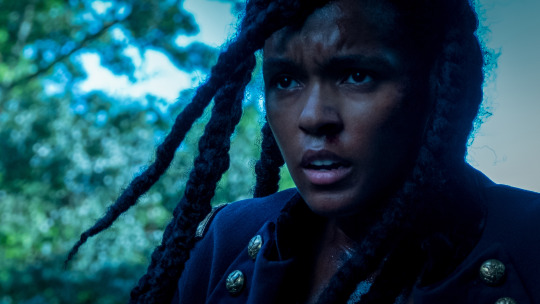
The Pantomimes of Racism.
Aaron Yap surveys the cinema landscape of slavery narratives, from The Birth of a Nation to Roots to Sankofa to Us, as he talks to writer-director duo Gerard Bush and Christopher Renz about their new addition to the catalog, Antebellum.
“It was important to us that we not serve as co-conspirators to further erasure of American history and not white-wash the past.” —Gerard Bush
Given its deep-seated psychic baggage as America’s original sin, slavery remains among the most contentious of subject matters to be portrayed in film. Widely embraced depictions are rare, while the notoriety of those tactless, or simply racist, offenders generally looms large in conversation.
Lest we forget, cinema itself was birthed in a vat of virulent racism. A monumental accomplishment like DW Griffith’s groundbreaking The Birth of a Nation (1915) was also a monument to the Ku Klux Klan. Likewise, Victor Fleming’s highly regarded Civil War-era romance Gone with the Wind (1939) presents the viewer with a problematic dichotomy: it’s an extraordinary feat of filmmaking, deeply—even perversely—intoxicating, but all its extravagant, impassioned melodrama cannot wash away the odious stain of its Black caricatures and pro-Confederacy cheerleading.
At the extreme end of this spectrum lurks the stomach-churning shockumentary tactics of Gualtiero Jacopetti and Franco Prosperi’s Goodbye Uncle Tom (1971). So deliberately pornographic in its attempts to upset and shock under the guise of educational, telling-it-like-it-is accuracy, this mondo opus might be the least easily recommendable movie ever—a film that once prompted Pauline Kael to deem it “the most specific and rabid incitement to race war.”
When citing respectable dramatizations of slavery, the Emmy-winning miniseries adaptation of Alex Haley’s sprawling bestseller Roots (1977) is still considered a benchmark. Without sacrificing the horrific authenticity of the experience, it was captivating, commercial television, but most crucially, a long-overdue corrective, centering African-Americans in a screen telling of their history. Also notable, both for its Black-centered storytelling and the ultra-independence of its 1983 release, is the little-seen Sankofa by Ethiopian filmmaker Haile Gerima—a member of the LA Rebellion (and father of Merawi Gerima, whose debut Residue has just landed on Netflix). Sankofa transports a contemporary African-American fashion model back in time to a slave plantation; it’s both a reckoning and an awakening, in honor of the “stolen spirits of Africa”.
Yet “white savior” narratives are prevalent to this day, whether it’s the well-meaning, virtuous legal theater of Steven Spielberg’s Amistad (1997) or the blaxploitation-tinged revisionist fantasia of Quentin Tarantino’s Django Unchained (2012). Even Steve McQueen’s much-lauded adaptation of abolitionist Solomon Northup’s memoir 12 Years a Slave (2013) isn’t completely untethered from the assistance of a white hand.
Perhaps something thornier like Richard Fleischer’s Mandingo (1975), frequently written off as a lurid, trashy potboiler imagining of the slave trade, deserves more than a cursory look for the way it removes clearly delineated archetypes of heroes and villains, and cathartic beats of obstacle and triumph, from the slave narrative. It exposes the poisoned capitalist pathology that produces the system—observing how souls, constantly besieged by hubris, greed and frail egos, self-implode as the unchecked power that comes with the commodification of human bodies grows.
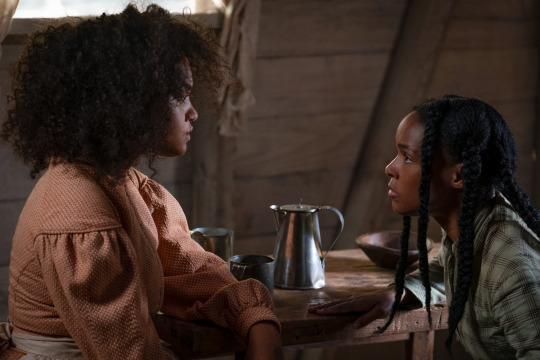
Kiersey Clemons and Janelle Monáe in ‘Antebellum’.
Now available digitally after its theatrical release was abandoned due to Covid, Gerard Bush and Christopher Rez’s Antebellum contributes another complicated, fascinating wrinkle to the nuances of slavery cinema. The film arrives at a particularly volatile time, with additional resonance provided by the on-going, extremely topical plight of inequity faced by Black Americans.
Employing the malleable, high-concept language of genre to connect the sins of the past with the present—imagine something in the vicinity of Blumhouse doing Octavia E. Butler’s Kindred, or rebooting Sankofa for that matter—Antebellum is of a piece with the gathering momentum behind the popularity of recent Black-centered genre fare, from Jordan Peele’s horror outings Get Out (2017) and Us (2019) to recent HBO shows like Watchmen and Lovecraft Country. The temporal tricksiness of the film’s narrative structure means spoiler-free synopsizing is a fool’s errand, but “it’s not a traditional horror”, Renz says, proffering “a thriller with horror elements” to describe it.
What is clear from the get-go is that something’s a little off, and the film potentially has one foot in The Twilight Zone. Opening with a quote from William Faulkner’s Requiem for a Nun (“The past is never dead. It’s not even past”), Bush and Renz, who shared writing and directing duties, waste no time thrusting us—via a visually stunning five-minute one-take tracking shot—onto an impossibly beautiful Louisiana plantation where we’re introduced to Eden, the first of two roles played by Janelle Monáe, a slave whose plans to escape are brutally thwarted by Confederate officers.
The filmmakers maintained vigilance in their recreation of trauma and the slave experience. “It was important to us that we not serve as co-conspirators to further erasure of American history and not white-wash the past,” says Bush. “But it was always of equal importance that we not engage in gratuitous violence. It was all for a meaning and purpose. So much of it is off-screen—we don’t have any physical whipping or anyone at the whipping post or any of that. This is to inform and educate and move the story forward. It’s not meant to serve as some sort of entertainment for violence sake.”
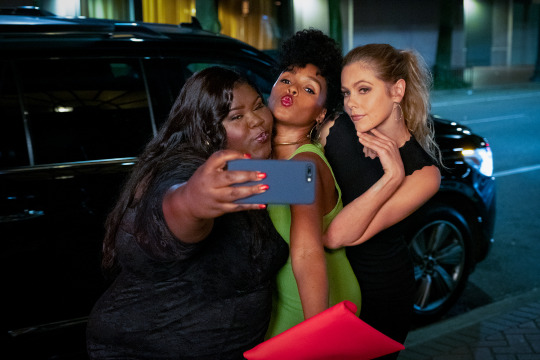
Gabourey Sidibe, Janelle Monáe and Lily Cowles in ‘Antebellum’.
Similarly, Bush says they were deliberate in their approach to using racial epithets of its time. The N-word is conspicuously absent for a film set in the Antebellum South. “It gives the audience an off-ramp to say, ‘That’s not language I would use so that’s not me, so I don’t have to engage in this and I don’t have to confront it’. These are the pantomimes of racism. The N-word and those words—they’re meant to dehumanize but just because you’re not hearing the word in the public square anymore—because it is no longer socially appropriate—doesn’t mean that all of the brutality and inequity that the word, the avatar, represented doesn’t exist anymore. It was important to us that we use the same language as Gone with the Wind in a way that they would refer to the enslaved people as the inferiors.”
In a purposefully disorienting plot shift, Antebellum moves off plantation grounds in its second act to establish Monáe’s second role, Veronica, a successful present-day academic promoting her new book Shedding the Coping Persona. Although the physical subjugation and barbarity of the past have disappeared, insidious micro-aggressions and hints remain, including the sinister presence of Jena Malone’s Southern antagonist Elizabeth, who also appears in both timelines.
For this portion, the film allows Veronica, who’s assertive, confident, free—the seeming mirror opposite of Eden—to live powerfully in her moment. Often accompanied by her bestie Dawn (a rambunctious, scene-stealing Gabourey Sidibe), these scenes foreground intersectionality, reflecting Bush and Renz’s desire to show Black women in a way that was familiar to them. “We’re surrounded by extraordinary Black women we see doing extraordinary things all the time.” Bush says. “We just don’t see it depicted on screen and we were determined that we had our opportunity, we were going to do that.”

Christopher Renz and Gerard Bush on the set of ‘Antebellum’.
Stylish, visually stunning and effectively pointed, Antebellum marks a natural career progression for Bush and Renz, who began in advertising before moving into social advocacy work. “For Christopher and [me], that competitive side from advertising is what lent itself so beautifully to our waking up one day and saying we didn’t want to sell champagne for the rest of our lives, but that we needed to tell stories that mattered, especially after Trayvon was murdered.”
“Once we decided to make movies it was because we didn’t see anything in the marketplace that looked like us. I don’t think that with the finite amount of time that we have in our lives, from when we’re born to when we transition and exit out of this place, that you want to waste it committing your life to something you don’t think you can be the best at that—that you can make meaningful contribution.”
Related content
Adam Davie’s Black Life in Film list
Letterboxd member Anjelica Jade’s review of Antebellum for Vulture
Haile Gerima’s 2019 TIFF Talk about Sankofa and independent filmmaking
Cece’s list of lighthearted movies with Black characters in them because we deserve movies that aren’t about slavery, racism, police brutality and the like
Follow Aaron on Letterboxd
#antebellum#janelle monae#christopher renz#gerard bush#bush and renz#sankofa#haile gerima#get out#jordan peele#letterboxd
11 notes
·
View notes
Text
FILMS2022
The Souvenir part 1 and 2 - Joanna Hogg
Picolo Corpo - Laura Samani
Liquorice Pizza - Paul Thomas Anderson
Introduction - Hong Sang-soo
Spencer - Pablo Larrain
Jane par Charlotte - Charlotte Gainsbourg
Red Rocket - Sean Baker
The Innocents - Eskil Vogt
Nos âmes d’enfants - Mike Mills
Petite Solange - Axelle Ropert
Nous - Alice Diop
Cow - Andrea Arnold
Residue - Merawi Gerima
Viens je t’emmène - Alain Guiraudie
Sous le soleil de Koutaïssi - Alexandre Koberidze
Bruno Reidal - Vincent Le Port
Azuro - Matthieu Rozé
Rien à foutre - Emmanuel Marre et Julie Lecoustre
Val - Léo Scott et Tiny Poo
Plumes - Omar El Zohairy
The Batman - Matt Reeves
Medusa - Anita Rocha da Silveira
Money boys - CB Yi
Enquêtes sur un scandale d’état - Thierry de Peretti
Un beau matin - Mia Hansen Løve
Théo et les Métamorphoses - Damien Odoul
La légende du Roi du crabe - Matteo Zoppis et Alessio Rigo de Righi
After Blue - Bertrand Mandico
Great Freedom - Sebastian Meise
Arthur Rambo - Laurent Cantet
Contes du hasard et autres fantaisies - Ryosuke Hamaguchi
Hit the Road - Panah Panahi
A Chiara - Jonas Carpignano
Qui à part nous - Jonas Trueba
Vortex - Gaspar Noé
Babysitter - Monia Chokri
Athena - Romain Gavras
EO - Jerzy Skolimowski
Bowling Saturn - Patricia Mazuy
Pacifiction - Albert Serra
Les Amandiers - Valeria Bruni-Tedeschi
Mon Pays Imaginaire - Patricio Guzman
Riposte Féministe - Marie et Simon Depardon
Coma - Bertrand Bonello
Close - Lukas Dhont
Saint Omer - Alice Diop
Juste sous vos yeux - Hong Sang Soo
Nope - Jordan Peele
1 note
·
View note
Photo

@capricci.cinema @mensch_agency #residue Residue/cinéma Un film de: Merawi Gerima Avec: Dennis Lindsey, Obinna Nwachukwu, Taline Stewart Durée:1h30 Au cinéma le 5 janvier Jay, la trentaine, revient dans le quartier de son enfance, à Washington, après 20 ans passés en Californie. Son objectif est de faire un film-documentaire sur ce quartier en donnant la parole à ceux qui d’ordinaire ne s’expriment pas. Mais tout a changé, il ne reconnait plus les lieux, ni les gens. La population afro-américaine a cédé la place à de nouveaux propriétaires bourgeois, individualistes, essentiellement blancs. La plupart de ses amis ont disparu, partis ailleurs, en prison ou morts. Il est notamment à la recherche de son meilleur ami d’enfance, dont personne ne veut lui donner de ses nouvelles. Pire, il a le sentiment qu’on lui cache la vérité. Le présent et son enfance se cofondent parfois, passant de l’un à l’autre en un instant. Ces brèves incursions dans les temps heureux de sa jeunesse sont des points de références qui lui permettent de mesurer l’ampleur de son propre naufrage et celui de ce quartier, transformé en véritable jungle où des membres de sa famille et quelques anciens amis tentent de survivre tant bien que mal. Ce film, à la fois violent et intimiste, restitue de façon poignante le désarroi d’un être qui, ayant perdu ses repères, ne sait plus qui il est. Residue a été présenté au festival de Slamdance 2020 et aux Venice Days de la Mostra 2020 https://www.instagram.com/p/CYE1zLfsxnT/?utm_medium=tumblr
0 notes
Text
0 notes
Text
Venezia a Napoli. Il cinema esteso

Grandi protagonisti del cinema mondiale in collegamento streaming con Napoli, masterclass, eventi speciali, oltre trenta ospiti negli incontri in diretta del “Live delle 19”, più di venti film e anteprime: “Venezia a Napoli. Il cinema esteso”, la rassegna cinematografica diretta da Antonella Di Nocera che propone una selezione tra le migliori opere dall'ultima Mostra Internazionale del Cinema di Venezia, organizzata da Parallelo 41 Produzioni con il contributo di Mibact e Regione Campania, festeggia la decima edizione quest'anno posticipata dal 14 al 20 dicembre online su MYmovies (accredito unico Euro 9,90, ridotto per gli studenti universitari della Campania Euro 5,90).Ospiti d'eccezione per il decennale, il maestro del cinema giapponese Shinya Tsukamoto, il cineasta taiwanese Tsai Ming Liang, che terranno due masterclass online, e l'artista newyorchese Laurie Anderson. Tanti i protagonisti che presenteranno i loro film in programma nell'edizione 2020, tra cui il grande regista statunitense Frederick Wiseman in uno speciale evento di apertura, i registi italiani Gianluca e Massimiliano De Serio, Jasmine Trinca, Alice Rohrwacher e Alessandro Rossellini, gli autori internazionali Kamir Aïnouz, Azra Deniz Okyay, Hilal Baydarov, Merawi Gerima e molti altri. Gli incontri di “Venezia a Napoli” saranno trasmessi su www.mymovies.it e sui canali social della rassegna (Facebook e sito www.veneziaanapoli.it). I titoli in calendario saranno disponibili dalle ore 12, visibili per 36 Read the full article
0 notes
Photo

In a year that drastically challenged the way we go about our daily lives, the world of cinema remained stronger than ever, and was an absolute welcomed indulgence in such dark times. These films we found to be the perfect salve to a world aflame, seen in new virtual cinemas, online film festivals, and various VOD platforms. (Support your local indie theater, they need you.)
Opinions differ, international release dates change, but here we offer the films that stuck with us: the ones that continually expand our window to the world, brought tears of laughter or love, or simply helped us believe in a better (or worse) tomorrow. Seek them out, and consider them high recommendations for this next chapter in human existence.
• • • • • • •
1. House of Hummingbird (d. Bora Kim) 2. Days (d. Tsai Ming-liang) 3. Lovers Rock (d. Steve McQueen) 4. Lingua Franca (d. Isabel Sandoval) 5. The Metamorphosis of Birds (d. Catarina Vasconcelos) 6. Last and First Men (d. Jóhann Jóhannsson) 7. Jasper Mall (d. Bradford Thomason & Brett Whitcomb) 8. I’m Thinking of Ending Things (d. Charlie Kaufman) 9. Kill It and Leave This Town (d. Mariusz Wilczynski) 10. Never Rarely Sometimes Always (d. Eliza Hittman) 11. The Woman Who Ran (d. Hong Sang-soo) 12. Nomadland (d. Chloé Zhao) 13. Residue (d. Merawi Gerima) 14. Time (d. Garrett Bradley) 15. Liberté (d. Albert Serra) 16. A Sun (d. Chung Mong-hong) 17. Bait (d. Mark Jenkin) 18. David Byrne’s American Utopia (d. Spike Lee) 19. The Wild Goose Lake (d. Diao Yinan) 20. Fourteen (d. Dan Sallitt) 21. Minari (d. Lee Isaac Chung) 22. Tomasso (d. Abel Ferrara) 23. Maɬni – towards the ocean, towards the shore (d. Sky Hopinka) 24. Another Round (d. Thomas Vinterberg) 25. To the Ends of the Earth (d. Kiyoshi Kurosawa) 26. Freeland (d. Mario Furloni & Kate McLean) 27. Swallow (d. Carlo Mirabella-Davis) 28. Wolfwalkers (d. Tomm Moore & Ross Stewart) 29. Deerskin (d. Quentin Dupieux) 30. Fire Will Come (d. Oliver Laxe) 31. Sorry We Missed You (d. Ken Loach) 32. Family Romance, LLC (d. Werner Herzog) 33. Ema (d. Pablo Larraín) 34. The Assistant (d. Kitty Green)
• • • • • • •
* These are simply our suggestions. Feel free to make your own list. 🖤😀🎥⏳😽⚡️🌻🖤
Honorable mentions: A Dim Valley, The Inheritance, Sanzaru, Possessor, Song Without a Name, IWOW: I Walk on Water, City Hall, She Dies Tomorrow, Soul, Tigertail, Disclosure, Babyteeth, I Was Home, But..., Ma Rainey’s Black Bottom, Da 5 Bloods
#2020#films#cinema#recommended#house of hummingbird#bora kim#days#tsai ming liang#lovers rock#steve mcqueen#lingua franca#isabel sandoval#the metamorphosis of birds#catarina vasconcelos#last and first men#johann johannsson#tilda swinton#jasper mall#window pictures#i'm thinking of ending things#charlie kaufman#kill it and leave this town#animation#mariusz wilczynski#never rarely sometimes always#eliza hittman#the woman who ran#hong sang soo#nomadland#chloe zhao
123 notes
·
View notes
